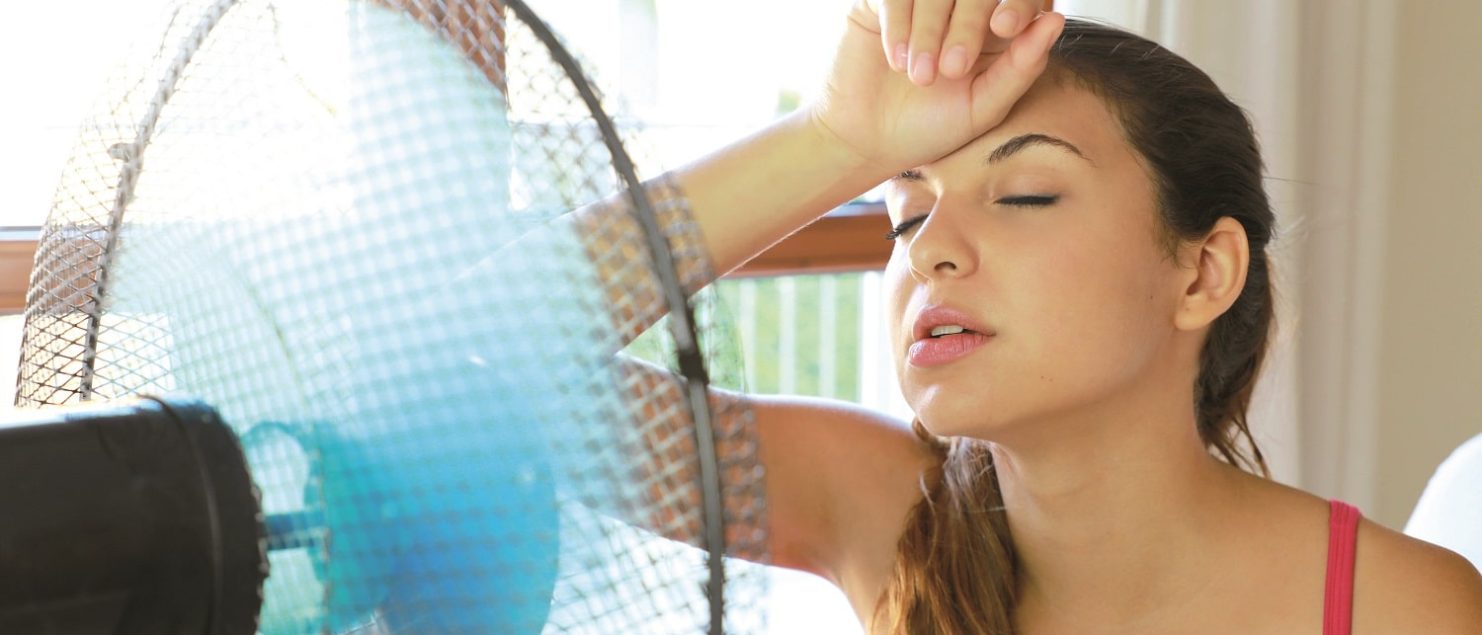Nadmierne pocenie się – jak pozbyć się problemu?
Wyobraź sobie, że jesteś na ważnym spotkaniu już kilka godzin, jest gorąco. Pot spływa po plecach, skrapla się na czole, pod pachami. Taka sytuacja staje się krępująca, zwłaszcza jeśli przy tym pojawi się nieprzyjemny zapach. Czy musimy się pocić i jak sobie z tym radzić? O odpowiedź poprosiliśmy specjalistkę w zakresie medycyny estetycznej dr n. med. Kingę Caban
– Organizm człowieka utrzymuje stałą temperaturę niezależnie od warunków atmosferycznych, dzięki termoregulacji, czyli zdolności do utrzymania temperatury ciała w zakresie optymalnym dla organizmu. Nawet przy wysokiej gorączce, czy przebywaniu na słońcu, chroni się przed przegrzaniem. Utrzymanie prawidłowej temperatury ciała jest możliwe dzięki naturalnemu procesowi, jakim jest pocenie się. Pot wydzielany jest przez gruczoły potowe, rozmieszczone w skórze. Największe ich skupiska znajdują się na dłoniach, stopach, na czole i pod pachami.
Pocimy się podczas zwiększonego wysiłku fizycznego, kiedy jesteśmy zbyt ciepło ubrani, temperatura otoczenia jest wysoka, czy spożywamy np. pikantne potrawy albo gorące napoje. Człowiek wydziela średnio pół litra potu dziennie, ale w różnych warunkach ta ilość może wzrosnąć nawet do kilku litrów. Zdarzają się też sytuacje, że organizm produkuje nadmierną ilość potu. Dzieje się tak np. w okresie dojrzewania, często problem dotyczy osób z nadwagą. Przyczyną nadmiernego wydzielania się potu jest również stres. Ta mało komfortowa sytuacja prowadzi do zdenerwowania, a tym samym do spotęgowania zjawiska.
Skoro w niektórych sytuacjach musimy się pocić, to w jaki sposób zapobiegać nieprzyjemnemu zapachowi?
– Podstawową sprawą jest higiena osobista. Sam pot jest bezwonny, składa się głównie z wody i soli mineralnych. Dopiero w połączeniu z bakteriami bytującymi na skórze, nabiera nieprzyjemnego zapachu. Pamiętać trzeba o umyciu i dokładnym osuszeniu skóry po każdym wysiłku fizycznym i po każdym spoceniu się. Ubrania powinny być przewiewne, najlepiej z naturalnych tkanin, bez sztucznych dodatków. Nie bez znaczenia jest też stosowana dieta – ograniczenie używek, spożywanie dużej ilości warzyw i owoców oraz picie co najmniej dwóch litrów wody dziennie.
A używanie antyperspirantów? Czy można stosować je w dowolnych ilościach? Są doniesienia, że niektóre z nich mogą mieć negatywny wpływ na zdrowie człowieka.
– Przede wszystkim musimy wiedzieć, że dezodoranty i antyperspiranty to nie to samo. Dezodoranty neutralizują zapach potu, a antyperspiranty zmniejszają pocenie się.
Głównymi składnikami aktywnymi antyperspirantów są sole glinowo-cyrkonowe oraz chlorek glinu. Substancje te posiadają zdolność wnikania do kanalików gruczołów potowych, gdzie ulegają krystalizacji, tworząc „czop” ograniczający wydzielanie potu.
W składzie dezodorantów można znaleźć natomiast substancje, które zapobiegają powstawaniu nieprzyjemnego zapachu potu. Należą do nich: triclosan, glikole, ekstrakty roślinne, a także metale srebra, cynku oraz miedzi. Substancje te, ze względu na swoje właściwości bakteriobójcze, ograniczają rozwój mikroorganizmów naturalnie bytujących na naszej skórze.
Czy antyperspiranty ze względu na swój skład, nie stanowią zagrożenia dla zdrowia?
– Istnieje wiele niepotwierdzonych informacji na temat działania rakotwórczego antyperspirantów. W rzeczywistości nie ma dowodów naukowych, które potwierdzałyby taki związek. Zaleca się natomiast powstrzymanie się przed użyciem zarówno antyperspirantów jak i dezodorantów bezpośrednio po goleniu skóry. Warto zwrócić również uwagę, że pot jest zdrową reakcją organizmu na wysiłek fizyczny, chroni przed przegrzaniem. Pocąc się możemy uwalniać toksyny, co pomaga zwalczać przeziębienia i infekcje. Całkowite wyeliminowanie potu więc nie jest dla organizmu bezpieczne. Dlatego antyperspirantom mówimy raczej “nie”. Dezodoranty nie stanowią aż takiego zagrożenia, choć też często zawierają sporo substancji chemicznych, szczególnie zapachowych. Dlatego jeśli dezodoranty, to najlepiej naturalne.
Wiele osób uskarża się jednak na nadmierną potliwość…
– Nadmierne wydzielanie potu czyli hiperhydroza jest związana ze zwiększoną aktywnością gruczołów potowych. Prawdopodobnie wynika z nadaktywności ośrodkowego układu nerwowego, co powoduje wzmożoną stymulację gruczołów potowych do wydzielania potu. Szacuje się, że nadmierne pocenie dotyka ok. 3% populacji. Wyróżniamy nadmierne pocenie pierwotne i wtórną nadmierną nadpotliwość. Pocenie pierwotne jest najczęściej ograniczone miejscowo i dotyka zwykle jednej lub kilku części ciała głównie dłoni, stóp i pach. Natomiast wtórna nadmierna nadpotliwość dotyczy całego ciała. Może występować w przebiegu różnych chorób m.in. cukrzycy, nadczynności tarczycy, hipoglikemii, przewlekłej obturacyjnej choroby płuc, w przebiegu niektórych chorób serca, chorób neurologicznych, psychicznych i nowotworowych oraz w zatruciach, gruźlicy, czy w czasie menopauzy.
Nie jest to tylko proces miejscowy dotykający ciała, ale indukuje niestety wiele problemów behawioralnych. Osoby zmagające się z nadpotliwością niechętnie nawiązują nowe znajomości, czy kontakt fizyczny, mają problemy w trakcie rozmowy o pracę, nie trudno się domyślić, że podanie spoconej ręki przyszłemu pracodawcy jest wielkim problemem. Pacjenci z hiperhydrozą częściej cierpią również na zaburzenia depresyjne.
Jak wobec tego radzić sobie z problemem?
– Współczesna medycyna posiada wiele sposobów, dlatego warto udać się do lekarza, który indywidualnie dobierze odpowiednie leczenie. Poza leczeniem miejscowym za pomocą maści i kremów, włącza się niekiedy leczenie ogólne, za pomocą choćby leków antycholinergicznych. Wykonuje się także zabiegi tj. jonoforeza, laseroterapia, mikrofale i ultradźwięki. Obecnie coraz bardziej popularnym i polecanym zabiegiem w przypadku nadpotliwości miejscowej, który osobiście wykonuję u moich pacjentów i bardzo sobie cenię, są iniekcje z toksyny botulinowej. W przypadku iniekcji botoksu dochodzi do blokady nerwów zaopatrujących gruczoły potowe w miejscach poddanych zabiegowi, co zmniejsza potliwość. Zabieg ten jest szybki, wysoce skuteczny i daje efekt na kilka miesięcy. Biorąc pod uwagę wiele wymienionych możliwości terapii warto więc zwrócić się do specjalisty i cieszyć pełnią życia.
Dziękujemy za rozmowę


